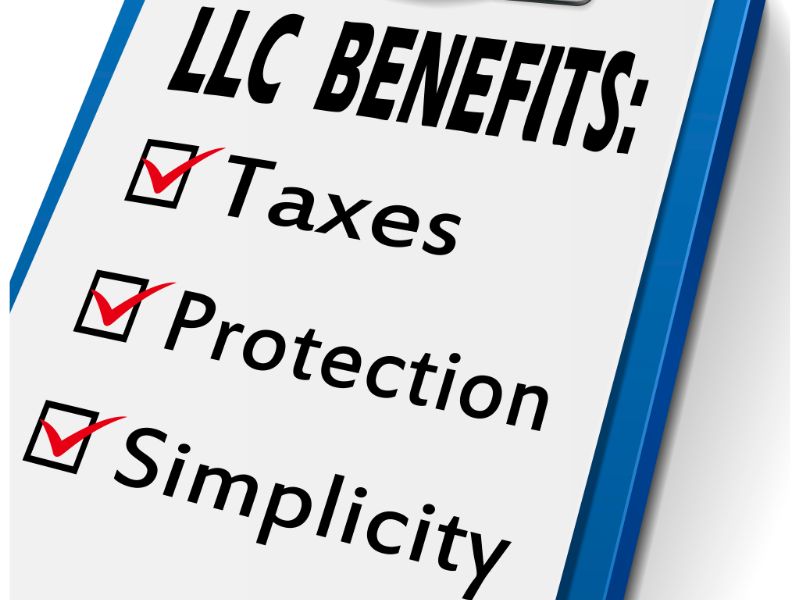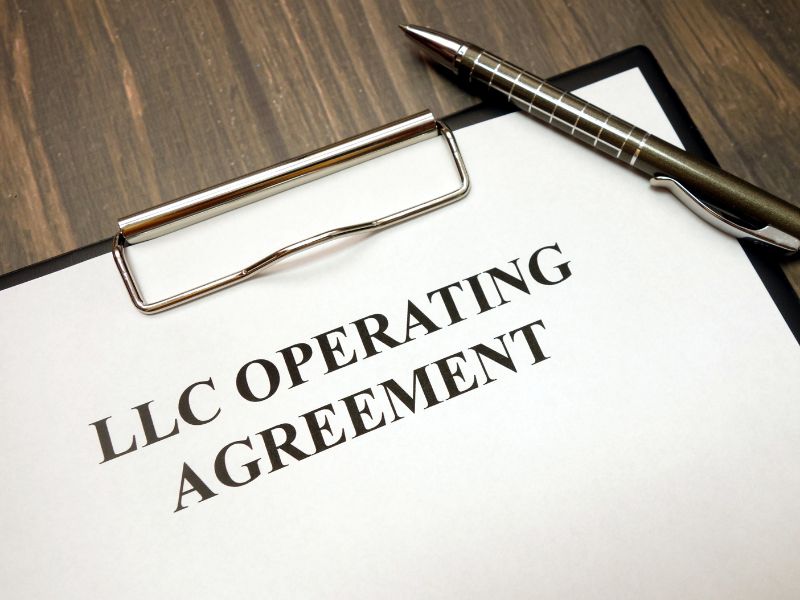Is your company outgrowing the structure of your limited liability company (LLC)? If you want to expand your business and bring in venture capital, you can convert your LLC to a corporation in a few easy steps. However, it’s crucial first to analyze how switching from an LLC to a corporation would affect your operations and tax obligations.
In this article, we’ll go through an overview of what to expect when converting to a corporation. We’ll look at the different conversion types and the advantages and disadvantages of making the switch.
Overview: LLCs versus corporations
LLCs and corporations have many benefits, including liability protection, a formal operational structure, and increased legitimacy. However, both must submit business formation paperwork to the state to operate legally.
Corporate operating structures tend to be more uniform and strict, and they also have greater reporting and recordkeeping obligations than LLCs. LLC owners can operate their businesses more freely and have more possibilities tax-wise. That said, both businesses shield owners from being personally liable for any obligations. This is because LLCs get taxed as sole proprietorships, partnerships, C corporations, or S corporations and are not restricted to any tax classification.
It is also a lot easier to transfer shares of a corporation than ownership interests in an LLC. For a company owner looking for outside investors, this makes a corporation marketable.
Ownership formation
Each LLC owner or member owns a certain percentage of the business. LLCs have operating agreements specifying the running of the business and how the company will handle a new or departing member.
That said, corporation owners (otherwise known as shareholders) have ownership percentages corresponding to the number of shares or business stocks they own. Not only is it easy for a business to approve more shares, but it’s equally as easy to transfer them to another person.
Management structure
LLCs have two options for management: either management by the members (otherwise known as owners) or by one or more managers, with the members serving more as passive investors. An LLC member and manager can design a management structure that suits their company’s needs rather than being bound by conventional duties or titles like CEO or vice president.
In contrast, corporations have a stricter management structure, with officers in charge of day-to-day operations and a board of directors who manage the company. Shareholder meetings must occur at least yearly. In corporations, shareholder and board meetings require extensive documentation and recordkeeping.
Tax structure
LLCs with a single member are automatically taxed as sole proprietorships, and multimember LLCs are taxed as partnerships. This means that company profits pass through the company to its members, and the members pay income and self-employment taxes on their shares.
On the other hand, corporations pay company taxes by filing corporate tax returns. If shareholders take distributions from the company, they are responsible for reporting those distributions on their tax returns. LLCs can avoid this double taxation by requesting to be taxed as a corporation.
Legal liabilities
LLCs and corporations both have limited liability. Any debts or legal actions brought against the company are not personally attributed to the proprietors. Owners of businesses are nonetheless responsible for their negligence.
Both corporations and LLCs should keep business and personal finances separate to protect liability. Additional documents must also be kept up to date for corporations. This includes information on the company’s board of directors, annual shareholder meetings, and corporate minutes.
Advantages and disadvantages of converting an LLC to a corporation
There are several advantages and disadvantages of converting from a limited liability company to a corporation. Here’s what you need to know to get started.
Advantages

- Shares of corporate stock in a corporation may be freely sold, given as a gift, or pledged. Furthermore, the “transfer of stock does not affect the separate legal status of a corporation,” according to Nguyen.
- It is simpler to develop employee incentive plans and obtain capital.
- The business can write off some health insurance costs and fringe perks.
- Corporations have well-established organizational structures.
- In some states, like California, corporations receive tax benefits that LLCs are not eligible for.
Disadvantages
Remember that maintaining a corporate structure comes at a higher cost because there are more tax filing obligations and a requirement to keep meeting minutes. This is why a corporation’s organizational structure is less adaptable.
Converting an LLC to a corporation might cause you to lose structure and flexibility. Before converting, consider the following difficulties:
Potential loss of flexibility: Compared to corporations, LLCs are subject to fewer restrictions and regulations. Corporate shareholders enjoy a variety of legal protections and rights, which includes the right to vote and the right to attend shareholder meetings. That implies that if your shareholders disagree with you, you won’t be able to carry out some of your objectives.
Double taxation: One of the significant drawbacks of conversion is that sometimes a corporation is subject to double taxation, with both the company and its shareholders paying tax on profits. Profits move through to shareholders’ personal tax returns, and the firm avoids double taxation, provided your company is eligible to become a corporation.
Costs associated with compliance: When you change your LLC into a corporation, you’ll also need to ensure that your corporation conforms with all relevant rules and laws. Corporations are usually subject to more compliance rules than LLCs. Compliance is a constant process that can get expensive depending on where your organization operates and what industry you’re in.
Changes in ownership and control: Selling and buying corporate shares is significantly easier than doing so for LLC membership interests. There is a chance that shareholders will eventually sell their shares to someone whose interests or viewpoints differ from yours when you convert your LLC to a corporation.
You also risk losing critical votes on things like mergers, sales, or board of director elections because corporate shareholders have legal rights to meetings and votes.
What are the three types of conversion
Each state recognizes three formal types of conversion. However, the statutory conversion requirements differ depending on the state. Let’s have a look at the different types and what they require:
- Statutory conversion
Companies can convert their LLCs to a corporation by filing the necessary forms with the secretary of state’s office. These forms include:
- Plan of conversion approved by LLC members
- Certificate of conversion
- LLC certificate of formation
- Members will also need to submit Form 8832 (for C corporations) or Form 2553 (for S corporations) to the IRS.
- Statutory merger
A statutory merger, like statutory conversion, instantly transfers the assets and liabilities of your LLC to the new corporation. However, you must establish your new corporation as a distinct legal organization before that transfer may occur.
The basic steps of a statutory merger are as follows:
- Prepare a plan for conversion
- LLC members vote to either approve or disapprove the merger in their roles as members and corporation shareholders.
- LLC members formally exchange membership rights for corporation shares.
- File a certificate of articles of incorporation.
- Nonstatuatory conversion
Nonstatuatory conversion is generally the most expensive and complicated way to convert your LLC to a corporation. This is because your assets and liabilities don’t automatically transfer to the new corporation. To convert an LLC, the following steps need to be taken:
- Legally transfer the LLC’s assets and liabilities to the corporation.
- Arrange the exchange of LLC membership interests for corporation shares.
- Otherwise, formally liquidate and then dissolve the LLC and start the process of creating a corporation from scratch.
Additional steps
Regardless of the conversion type you use to transform the legal structure of your LLC, you will still need to manage the transition process and complete all the steps necessary to establish a new organization. Let’s take a look at how this is done.
To understand the conversion process, you must:
- Review your state’s law to understand the steps for conversion better.
- Make sure your LLC documents permit conversion.
- Determine your company’s tax status.
- Prepare a certificate of formation.
- Draft and have a plan of conversion approved.
- Prepare a certificate of conversion and file it with the secretary of state’s office.
- Ensure you have the filing fees ($300 for the certification of formation and $300 for the certificate of conversion).
Once you’ve completed the above steps, you’ll need to prepare for the structure of your new organization. This includes the following steps:
- Draft corporate bylaws
- Choose corporate officers
- Appoint new directors
- Hold board meetings for members and potential shareholders
- Issue stock certificates
- File articles of incorporation or other relevant documents with the secretary of state’s office
The timeline for completing the conversion differs in each state. However, the secretary of state’s office usually takes five to seven business days to process requests. Bear this in mind when filing your conversion papers and prepare for a minimum 10-day wait before receiving any feedback.
To keep your company’s limited liability, you must adhere to all the formalities needed to establish and manage a corporation.
Last but not least, you must make sure that switching from an LLC to a corporation won’t invalidate any business contracts or agreements, such as bank paperwork, leases, licenses, and insurance.
Common mistakes to avoid when converting an LLC to a corporation

1. Make sure you have an operating agreement. An operating agreement highlights the financial and functional decisions, including rules, regulations, and business provisions. This is a critical factor in legally converting from an LLC to a corporation.
2. Make sure you’ve got all the correct documents. It’s essential to have all the necessary organizational documents, resolutions, and bylaws for the court to see that you’ve managed your LLC well.
3. Get your business records in order. When you make business decisions, even if they’re small, document each decision. If you’re a single-member LLC, you can have meetings with yourself and keep minutes via online documents that are accessible at any time.
4. Make sure you have the right amount of funds. Before signing any conversion forms, there must be enough funds to pay any legal debts or operating expenses.
Conclusion
Your business may be better prepared for expansion if you convert your LLC to a corporation. However, as with any business decision, you must weigh the advantages and disadvantages of converting. Before deciding to change the form of your firm, be sure to speak with a qualified accountant or attorney.

